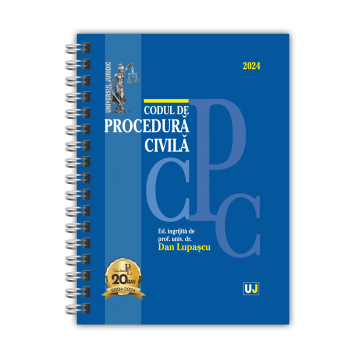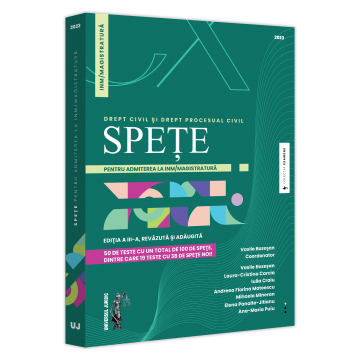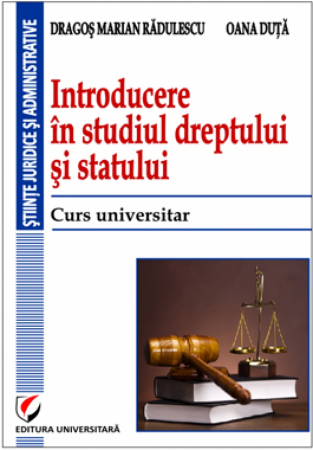ISBN: 978-606-591-349-3
DOI: 10.5682/9786065913493
Publisher year: 2012
Edition: III
Pages: 144
Publisher: Editura Universitara
Author: Daniel-Mihail Sandru
- Description
- Download (1)
- Authors
- Content
- More details
- Where to find it
- Reviews (0)
1.1. Legal acculturation and "lex mercatoria". About the transnational phenomenon in a globalizing era.
Globalization is an economic, technical and financial phenomenon but it has an impact on all areas, including law.
In the classical age of law, the state was the only sovereign to enact rules of law. This rule has changed with the globalization (globalization) of "legislation":
- the flow of globalization to create a "race of norms", both national and international, to which are added the practices of participants in international trade;
- it becomes mandatory to compare national legislations, in the situation where the flow of globalization becomes more and more constraining (for example, the protection or facilities offered to investors);
- the form of legislation remains the same, but is modified, sometimes in a "chaotic manner" by more or less binding international provisions.
1.2. Institutions of globalization.
There is a new world economic structure that is changing classical systems of law. The main effect of this legal acculturation (discussing the Americanization of French law and the continentalization of English law) leads to a new legislation, in which the defining features of a system are no longer found in almost any field.
1.3. Areas of international trade law in which globalization has effects.
Regional or global institutions receive more and more competences, which they share with the Member States, having the possibility to decide in litigations of an international nature (Court of Justice of the European Union - within the EU, respectively, the Dispute Settlement Body in within the World Trade Organization).
Section 2. Definition of international trade law
International trade law is that branch of law which regulates the patrimonial relations between the subjects of international trade and which has the character of commerciality and internationality.
France had the idea to propose (at the UNCITRAL session in New York in 1970) a Framework Convention on International Trade Law but the proposal was never debated.
The content of international trade law consists of its own material norms but also norms of material law that belong to other fields (for example, civil procedural law - commercial arbitration; civil law - legal acts, mainly contracts).
Section 3. Principles of international trade law
Principles of international trade law:
- the principle of legal equality of the parties;
- the principle of freedom of trade;
The sale of certain products, even authentic ones, without the manufacturer's consent, was considered counterfeit. In a case, settled in France, by TGI Paris, it was considered that Microsoft's agreement was necessary for its products to be sold on eBay.
- the principle of good faith;
- the principle of fair competition.
There is an interpenetration between the principles of international trade law, which cannot be respected in the fullness of their effects separately, there is a relationship of determination and interdependence.
Section 4. Object of international trade law
The object of international trade law is given by the following features:
- patrimonial character;
The cultural field was the subject of discussions, mentioning here the customs duties imposed on some art objects (Brancusi case, 1928) as well as the definition of goods given by the CJEU in the litigations regarding the free movement of goods.
- commercial character; This character is not uniform, in the sense that certain states (including Romania) have a monistic system of legislation, in which private law includes both civil law norms and commercial law norms (or for professionals).
- international character.
Section 5. International trade law and other branches of law
Commercial law
With the entry into force of the New Civil Code, the Commercial Code was repealed, the commercial relations being carried out by professionals (instead of traders) and enterprises, and the commercial documents no longer find a correspondent in the legislation. International trade law regulates legal relations similar to those of commercial law (they have a patrimonial and commercial character) but in the international trade law the national norms are applicable only when they are lex causae. In most cases, international trade law regulates legal relations by its own, specific rules (for example: international conventions, international customs).
Civil procedural law
International trade law also contains references to the rules of civil procedure. Thus, the Rules of Arbitration Procedure stipulate that “these Rules shall be supplemented by the provisions of common procedural law Romanian civil law insofar as they are compatible with the arbitration and with the commercial nature of the litigations ”(art. 79).
Private international law
The strongest links are with private international law. In the beginning, a chapter of this discipline, the law of international trade became in time an autonomous discipline. The literature discusses the composite nature of international trade law, as well as the fact that most authors treat it from a national point of view. Private international law is defined by the conflict rule - which is lacking in international trade law.
Public international law
The most important difference from the public branch of international law is that the subjects have different legal positions. While in international trade law relations are of legal equality, in public international law states (the main subjects) act as sovereign powers.
The most-favored-nation clause is a field regulated by public international law, but with a direct impact both on contracts and on the settlement of disputes by specialized arbitral tribunals.
-
Dreptul comerţului internaţional
Download
University professor at the University of Bucharest, "Dimitrie Cantemir" Christian University. He founded and coordinates the Center for European Law Studies of the Institute for Legal Research „Acad. Andrei Radulescu ”of the Romanian Academy. Ad hoc judge at the European Court of Human Rights and arbitrator at the International Commercial Arbitration Court attached to the Romanian Chamber of Commerce and Industry. President of the Society of Legal Sciences and of the Romanian Association of European Law and Affairs. Editor-in-Chief of the Romanian Journal of European Law (Wolters Kluwer).
Abbreviations / 7
INTRODUCTION / 9
Section 1. International trade law in the age of globalization / 9
Section 2. Definition of international trade law / 10
Section 3. Principles of international trade law / 11
Section 4. Object of international trade law / 11
Section 5. International trade law and other branches of law / 12
CHAPTER I. THE ROLE OF INTERNATIONAL ORGANIZATIONS IN THE DEVELOPMENT AND UNIFORMIZATION OF INTERNATIONAL TRADE / 14
Section 1. World organizations / 14
Section 2. Regional organizations / 23
Section 3. Institutes of international law / 31
CHAPTER II. SOURCES OF INTERNATIONAL TRADE LAW / 32
Section 1. Internal sources / 32
Section 2. International sources / 33
Section 3. Importance of international commercial uses / 36
Section 4. Judicial and arbitral practice / 37
CHAPTER III. LEGAL REPORT ON INTERNATIONAL TRADE / 38
Section 1. Preliminary considerations / 38
Section 2. Trading companies / 38
Section 3. Representations of foreign companies and economic organizations / 50
Section 4. Integration of international companies / 53
Section 5. State participation in international trade relations / 53
Section 6. About acts and deeds of trade after the entry into force of the New Civil Code / 54
CHAPTER IV. INSOLVENCY IN INTERNATIONAL TRADE LAW / 55
Section 1. The concept of insolvency in international trade law / 55
Section 2. International regulations in the field of insolvency / 60
Section 3. Insolvency regulation in the European Union / 63
Section 4. Model laws on insolvency / 70
CHAPTER V. COMMERCIAL COMPETITION IN INTERNATIONAL TRADE LAW. EUROPEAN REGULATIONS / 73
Section 1. Preliminary information / 73
Section 2. Principles of European Union regulations / 74
CHAPTER VI. INTERNATIONAL TRADE CONTRACTS. INTERNATIONAL CONTRACT OF SALE OF GOODS / 77
Section 1. General rules / 77
Section 2. Assignment of receivables in international trade law / 82
Section 3. Contract for the international sale of goods / 89
CHAPTER VII. INTERNATIONAL COMMERCIAL ARBITRATION / 103
Section 1. Regulations applicable to arbitration / 103
Section 2. Arbitrability of commercial disputes / 105
Section 3. Material jurisdiction of the arbitration court / 113
Section 4. Arbitral tribunal settling the dispute / 120
Section 5. The procedure for notifying the arbitral tribunal and the conduct of the arbitral proceedings / 125
Section 6. Abolition of the arbitral award / 130
Section 7. Execution of the arbitral award / 133
Section 8. Competence of CIRDI / ICSID - specialized institutional arbitration / 136
SELECTIVE BIBLIOGRAPHY / 140
Section 1. International trade law in the age of globalization
1.1. Legal acculturation and "lex mercatoria". About the transnational phenomenon in a globalizing era.
Globalization is an economic, technical and financial phenomenon but it has an impact on all areas, including law.
In the classical age of law, the state was the only sovereign to enact rules of law. This rule has changed with the globalization (globalization) of "legislation":
- the flow of globalization to create a "race of norms", both national and international, to which are added the practices of participants in international trade;
- it becomes mandatory to compare national legislations, in the situation where the flow of globalization becomes more and more constraining (for example, the protection or facilities offered to investors);
- the form of legislation remains the same, but is modified, sometimes in a "chaotic manner" by more or less binding international provisions.
1.2. Institutions of globalization.
There is a new world economic structure that is changing classical systems of law. The main effect of this legal acculturation (discussing the Americanization of French law and the continentalization of English law) leads to a new legislation, in which the defining features of a system are no longer found in almost any field.
1.3. Areas of international trade law in which globalization has effects.
Regional or global institutions receive more and more competences, which they share with the Member States, having the possibility to decide in litigations of an international nature (Court of Justice of the European Union - within the EU, respectively, the Dispute Settlement Body in within the World Trade Organization).
Section 2. Definition of international trade law
International trade law is that branch of law which regulates the patrimonial relations between the subjects of international trade and which has the character of commerciality and internationality.
France had the idea to propose (at the UNCITRAL session in New York in 1970) a Framework Convention on International Trade Law but the proposal was never debated.
The content of international trade law consists of its own material norms but also norms of material law that belong to other fields (for example, civil procedural law - commercial arbitration; civil law - legal acts, mainly contracts).
Section 3. Principles of international trade law
Principles of international trade law:
- the principle of legal equality of the parties;
- the principle of freedom of trade;
The sale of certain products, even authentic ones, without the manufacturer's consent, was considered counterfeit. In a case, settled in France, by TGI Paris, it was considered that Microsoft's agreement was necessary for its products to be sold on eBay.
- the principle of good faith;
- the principle of fair competition.
There is an interpenetration between the principles of international trade law, which cannot be respected in the fullness of their effects separately, there is a relationship of determination and interdependence.
Section 4. Object of international trade law
The object of international trade law is given by the following features:
- patrimonial character;
The cultural field was the subject of discussions, mentioning here the customs duties imposed on some art objects (Brancusi case, 1928) as well as the definition of goods given by the CJEU in the litigations regarding the free movement of goods.
- commercial character; This character is not uniform, in the sense that certain states (including Romania) have a monistic system of legislation, in which private law includes both civil law norms and commercial law norms (or for professionals).
- international character.
Section 5. International trade law and other branches of law
Commercial law
With the entry into force of the New Civil Code, the Commercial Code was repealed, the commercial relations being carried out by professionals (instead of traders) and enterprises, and the commercial documents no longer find a correspondent in the legislation. International trade law regulates legal relations similar to those of commercial law (they have a patrimonial and commercial character) but in the international trade law the national norms are applicable only when they are lex causae. In most cases, international trade law regulates legal relations by its own, specific rules (for example: international conventions, international customs).
Civil procedural law
International trade law also contains references to the rules of civil procedure. Thus, the Rules of Arbitration Procedure stipulate that “these Rules shall be supplemented by the provisions of common procedural law Romanian civil law insofar as they are compatible with the arbitration and with the commercial nature of the litigations ”(art. 79).
Private international law
The strongest links are with private international law. In the beginning, a chapter of this discipline, the law of international trade became in time an autonomous discipline. The literature discusses the composite nature of international trade law, as well as the fact that most authors treat it from a national point of view. Private international law is defined by the conflict rule - which is lacking in international trade law.
Public international law
The most important difference from the public branch of international law is that the subjects have different legal positions. While in international trade law relations are of legal equality, in public international law states (the main subjects) act as sovereign powers.
The most-favored-nation clause is a field regulated by public international law, but with a direct impact both on contracts and on the settlement of disputes by specialized arbitral tribunals.
Customer Support Monday - Friday, between 8.00 - 16.00
0745 200 718 0745 200 357 comenzi@editurauniversitara.ro
6359.png)
![International trade law - Daniel-Mihail Sandru [1] International trade law - Daniel-Mihail Sandru [1]](https://gomagcdn.ro/domains/editurauniversitara.ro/files/product/large/dreptul-comerului-internaional-1789-844886.jpg)














